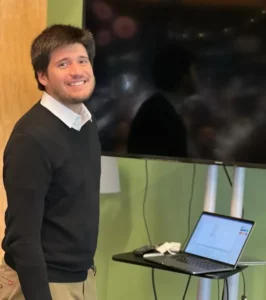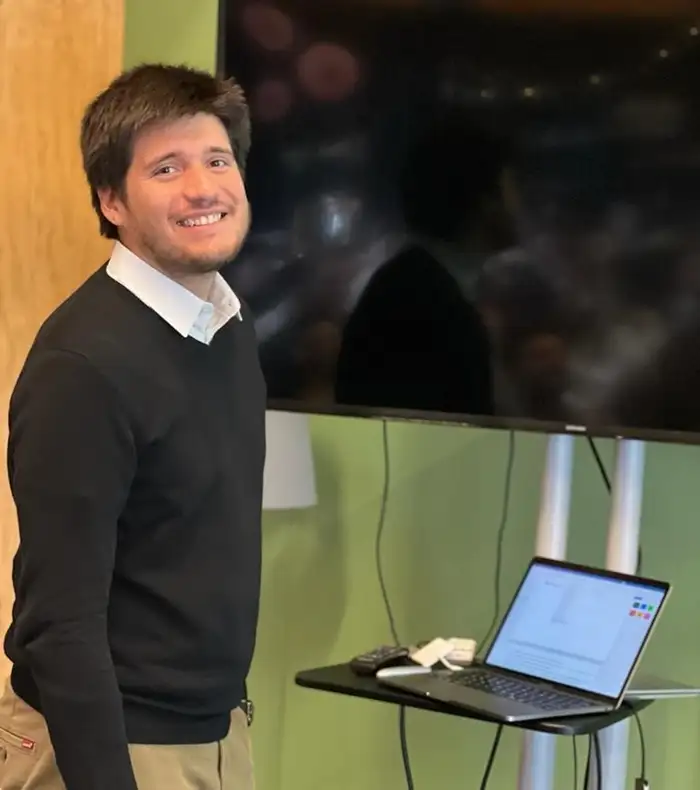Dr Alberto Pérez de Alba Ortíz has been appointed as assistant professor in Computational Soft Matter, affiliated both to the van ‘t Hoff Institute for Molecular Sciences and the Informatics Institute. Using machine learning- and free energy-based strategies, he aims to design novel living-like materials with tunable and responsive properties. Such materials promise solutions for urgent challenges in sustainability and biomedicine.

Pérez de Alba Ortíz is no stranger to the UvA Faculty of Science, as he obtained his PhD with Dr Bernd Ensing of the HIMS Computational Chemistry group in 2021 (with the distinction cum laude). He will now be working at the Computational Soft Matter Lab, an interfaculty cooperation between the van ‘t Hoff Institute for Molecular Sciences (HIMS), the Informatics Institute (IvI) and the Institute of Physics (IoP).
Artificial Intelligence for Sustainable Molecules and Materials
Together with professors Noushine Shahidzadeh (IoP/WZI) and Sander Woutersen (HIMS), Alberto has recently obtained a grant from the faculty’s Research Priority Area ‘AI for Sustainable Molecules and Materials’. This will enable a postdoc researcher to work on controlled salt hydrates for sustainable thermal energy storage. Pérez de Alba Ortíz will also be a partner in another project involving machine learning-based models of plant protein mixtures for sustainable food design. This was recently granted to Prof. Peter Bolhuis, Dr Herke van Hoof, Dr Sara Jabbari-Farouji, Dr Francesca Quattrocchio and Prof. Peter Schall.
Designing soft matter in and out of equilibrium
Right before starting his new appointment, Pérez de Alba Ortíz co-organized a Lorentz Center workshop, gathering 55 researchers of various affiliations, nationalities, career-stages and backgrounds. During a dynamic program with lively discussions in between talks by renowned experts, the participants exchanged knowledge and methods across fields. The main topics of this workshop were: soft, bio and active matter, inverse and forward design, (un)supervised machine learning, enhanced sampling, data-driven synthesis and automated experiments.
Alberto Pérez de Alba Ortíz studied Engineering Physics at Tecnológico de Monterrey in Mexico, where he also worked for the cement and steel industry. He later moved to TU München, supported by a personal scholarship, to study an MSc in Computational Science and Engineering. For his thesis, he worked on adaptive quantum mechanics/molecular mechanics (QM/MM) simulations of proton transfers and Bayesian inference of reaction coordinates in the group of Prof. Karsten Reuter. In parallel, he was a research assistant in the group of Prof. Martin Zacharias, developing enhanced sampling methods for biomolecular transitions. Supported by a personal fellowship, he then pursued his PhD in the group of Dr Bernd Ensing in HIMS Computational Chemistry. His research focused on developing and applying advanced methods to understand complex chemical and conformational processes in biomolecules such as polysaccharides, peptides and DNA. Additionally, he worked on machine learning approaches to discover optimal descriptors for molecular transitions. He visited the group of Prof. Carme Rovira at Universitat de Barcelona with a personal grant from HPC-Europa3 to work on QM/MM simulations of light-sensing proteins. In 2021, he received his PhD cum laude and joined the Soft Condensed Matter group of Prof. Marjolein Dijkstra at Utrecht University, where he worked on bottom-up design of self-assembly in soft and porous materials at colloidal scales.
See also
Research Priority Area AI for Sustainable Molecules and Materials
